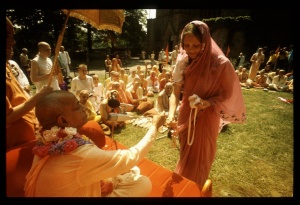SB 4.25.43: Difference between revisions
(Vanibot #0018 edit: make synonym terms in Sanskrit italic in SB - Vanisource) |
(Vanibot #0054 edit - transform synonyms into clickable links, which search similar occurrences) |
||
| Line 24: | Line 24: | ||
<div class="synonyms"> | <div class="synonyms"> | ||
''nāradaḥ uvāca'' | ''[//vanipedia.org/wiki/Special:VaniSearch?s=nāradaḥ&tab=syno_o&ds=1 nāradaḥ] [//vanipedia.org/wiki/Special:VaniSearch?s=uvāca&tab=syno_o&ds=1 uvāca]'' — the great sage Nārada spoke; ''[//vanipedia.org/wiki/Special:VaniSearch?s=iti&tab=syno_o&ds=1 iti]'' — thus; ''[//vanipedia.org/wiki/Special:VaniSearch?s=tau&tab=syno_o&ds=1 tau]'' — they; ''[//vanipedia.org/wiki/Special:VaniSearch?s=dam&tab=syno_o&ds=1 dam]-[//vanipedia.org/wiki/Special:VaniSearch?s=patī&tab=syno_o&ds=1 patī]'' — husband and wife; ''[//vanipedia.org/wiki/Special:VaniSearch?s=tatra&tab=syno_o&ds=1 tatra]'' — there; ''[//vanipedia.org/wiki/Special:VaniSearch?s=samudya&tab=syno_o&ds=1 samudya]'' — being equally enthusiastic; ''[//vanipedia.org/wiki/Special:VaniSearch?s=samayam&tab=syno_o&ds=1 samayam]'' — accepting one another; ''[//vanipedia.org/wiki/Special:VaniSearch?s=mithaḥ&tab=syno_o&ds=1 mithaḥ]'' — mutually; ''[//vanipedia.org/wiki/Special:VaniSearch?s=tām&tab=syno_o&ds=1 tām]'' — in that place; ''[//vanipedia.org/wiki/Special:VaniSearch?s=praviśya&tab=syno_o&ds=1 praviśya]'' — entering; ''[//vanipedia.org/wiki/Special:VaniSearch?s=purīm&tab=syno_o&ds=1 purīm]'' — in that city; ''[//vanipedia.org/wiki/Special:VaniSearch?s=rājan&tab=syno_o&ds=1 rājan]'' — O King; ''[//vanipedia.org/wiki/Special:VaniSearch?s=mumudāte&tab=syno_o&ds=1 mumudāte]'' — they enjoyed life; ''[//vanipedia.org/wiki/Special:VaniSearch?s=śatam&tab=syno_o&ds=1 śatam]'' — one hundred; ''[//vanipedia.org/wiki/Special:VaniSearch?s=samāḥ&tab=syno_o&ds=1 samāḥ]'' — years. | ||
</div> | </div> | ||
Latest revision as of 21:41, 18 February 2024

A.C. Bhaktivedanta Swami Prabhupada
TEXT 43
- nārada uvāca
- iti tau dam-patī tatra
- samudya samayaṁ mithaḥ
- tāṁ praviśya purīṁ rājan
- mumudāte śataṁ samāḥ
SYNONYMS
nāradaḥ uvāca — the great sage Nārada spoke; iti — thus; tau — they; dam-patī — husband and wife; tatra — there; samudya — being equally enthusiastic; samayam — accepting one another; mithaḥ — mutually; tām — in that place; praviśya — entering; purīm — in that city; rājan — O King; mumudāte — they enjoyed life; śatam — one hundred; samāḥ — years.
TRANSLATION
The great sage Nārada continued: My dear King, those two—the man and the woman—supporting one another through mutual understanding, entered that city and enjoyed life for one hundred years.
PURPORT
One hundred years is significant in this connection because every human being is given the concession to live up to a hundred years. The span of life is different on different planets, according to the planet's distance from the sun. In other words, one hundred years on this planet is different from one hundred years on another planet. Lord Brahmā lives for one hundred years according to time on the Brahmaloka planet, but one day of Brahmā is equal to millions of years on this planet. Similarly, the days on the heavenly planets are equal to six months on this planet. On every planet, however, the span of life for a human being is roughly one hundred years. According to the life-spans on different planets, the standards of living also differ.